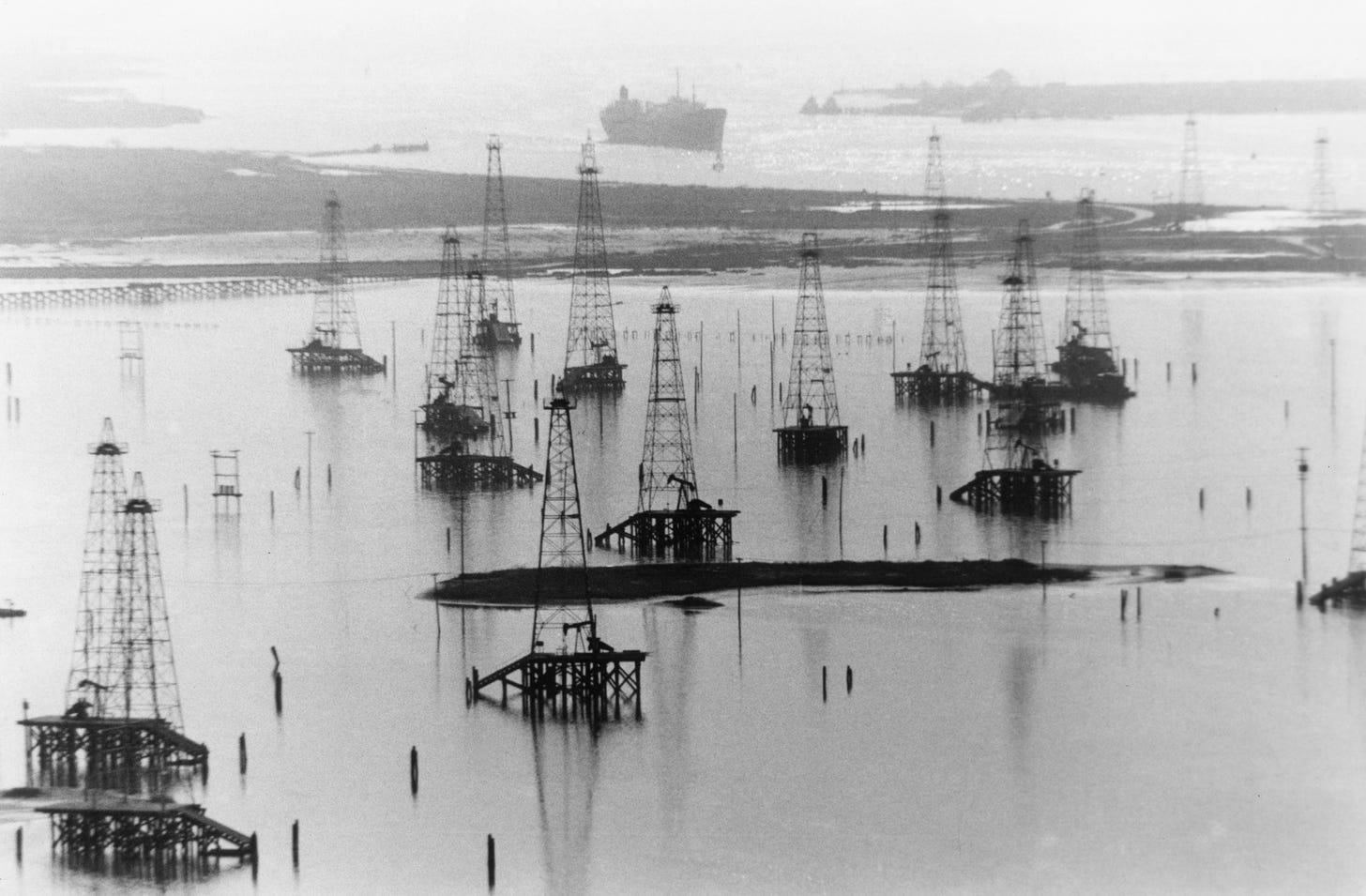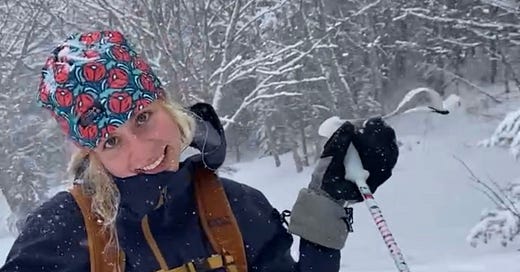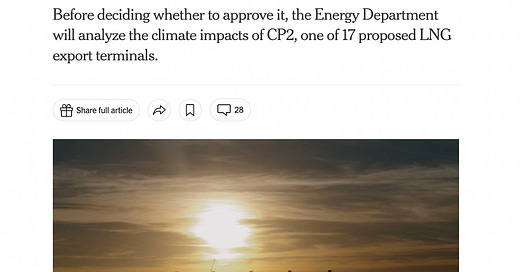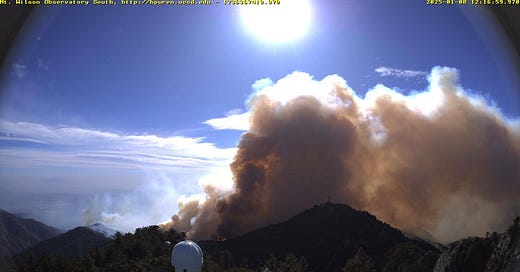
Something went right?!
Through no fault of its own, Biden's team gets a big win on climate

Last summer the Biden administration granted the largest set of offshore oil leases in American history. The ironies abounded—Biden had insisted during his campaign that he would not be doing this (“And by the way, no more drilling on federal lands, period. Period, period, period,” he’d explained during the New Hampshire primary); it was the Interior Department that officially sold the leases, headed by a secretary, Deb Haaland, that environmentalists had fought like crazy to get confirmed.
At the time, the administration claimed that it had no choice: its hands had supposedly been tied by a ruling from a Louisiana court that sided with 13 GOP attorney generals to force a lease. Attorneys in the environmental movement disagreed, saying that the Biden administration could simply have delayed, in order to do a full assessment of the climate impact. They were disregarded—perhaps in part because the administration was dealing with a spike in gasoline prices and feared the optics, or because it was still in sucking-up mode to Prime Minister Manchin and didn’t want to give him offense.
Whatever the reason, it turned out the environmentalists were right and the administration wrong—yesterday a federal court ruled that indeed the lease sale should be postponed until that climate assessment could be conducted. And when it is conducted, it will clearly show that drilling for more oil and gas will increase the planet’s temperature. (This is called ‘physics’).
All honor to the crew at EarthJustice who brought the suit, aided by groups like Friends of the Earth, the Center for Biological Diversity, Healthy Gulf, and the Sierra Club. Assuming that the Biden administration doesn’t appeal (and if they do, no tender concern for Manchin’s feelings will dampen the howls from the environmental movement) and that industry can’t find some other legal angle to pursue, this buys time—time for, if nothing else, renewable energy to keep getting cheaper. At least for the moment, that oil and gas is safely stored under the Gulf, where the good Lord put it.
That wasn’t the only win last week. The Los Angeles City Council took big steps toward banning new drilling within city limits, a federal appeals court struck down some key approvals for the proposed Mountain Valley pipeline, and Third Act launched a major campaign against the big banks funding the fossil fuel industry. (Thanks to CBS for its coverage this morning)
In other climate news this week:
+Batteries are getting better fast—a new breakthrough may mean that they’re getting light enough to imagine long-haul electric airplanes
+An interesting debate in the Nation between Andreas Malm and Daniel Sherrell on whether eco-sabotage (blowing up pipelines) would be a useful tactic. Sherrell, arguing no, seems far more in touch with actual political reality to me.
+Salon carries an interview with the wonderful Varshini Prakash, a founder and key leader of the Sunrise Movement and the biggest single reason that we even got a chance to consider the Green New Deal/Build Back Better. It’s obviously been a bitter few months as they watch Manchin and the GOP block their efforts, but she comes out with the right lesson:
Organize better, organize smarter. We need to build power that can outweigh the power of these extremely corrupt organizations and corporations that are throwing our future into peril. The struggle that we have had to pass climate policy — or any policy that will help people — in this country is devastating, and it begs more questions not just for the climate crisis, but for the future of this country and where it is headed. But I'm positive that the only antidote to a very uncertain and chaotic future is for people to get involved. From my understanding, that is the only thing that has ever truly changed the course and direction of a country's history.
+The folks at sustainable web bank Ando have launched a new website to help college divestment organizers.
+As Finis Dunaway argues in the Hill, it’s time to end the oil business in the Arctic National Wildlife Refuge once and for all—and Congress could and should do it this year, before Democratic majorities disappear
+Across Africa’s Sahel, an effort to plant a nine-mile-wide Green Wall appear to be making progress after 15 years of work, according to a fascinating and beautiful photo essay in the Times. Meanwhile, Bloomberg chronicles the hard job of the new “heat officer” for Sierra Leone’s sprawling capital of Freetown.
Freetown, like many cities around the world, is increasingly threatened by dangerous temperatures. A study published in the scientific journal PNAS last year found that extreme heat exposure in 13,115 cities nearly tripled between 1983 and 2016, affecting 1.7 billion people. The researchers found that the health risk of extreme heat is “highly unequal and severely impacts the urban poor.”
Meanwhile, the latest installment of our epic nonviolent yarn. If you need to catch up on the first 42 chapters of The Other Cheek, check out the archive. (And if you’re wondering if you missed a chapter, I think not—last week Ch. 41 and 42 got smushed together as one, illustrating the dangers of serialization.)
The next morning the young people reconvened in Professor Vukovic’s office after breakfast. He and Cass had eaten early, so he could join a web conference with immigration rights activists in Australia, and Perry and MK and Gloria arrived just as they were hanging up. “Allie has class, and there’s a quiz, but afterwards she’s going to ask Maria if she can join us,” said MK.
“Do you like puzzles?” the professor asked Gloria.
“I like Gameboy,” she said. “But my mother doesn’t let me have it. Everyone else has it.”
“I’m sorry you don’t like puzzles,” he said. “I was going to ask you to help with this one, which was mine when I was a boy. It’s a jigsaw, of Noah’s Ark.”
“Maybe I like puzzles,” said Gloria, who was staring at the old wooden box filled with die-cut pieces of brightly-colored wood.
“Well, I’m much too old to figure out how it goes together any more, so you’d be doing me a great favor if you gave it a try,” he said.
“Okay,” she said, settling down on a corner of the floor and beginning to look at the pieces. “Giraffe. Hipnoceros. Monkey. Other monkey.”
The other four settled down to planning, poring over maps to work out a tentative list of sites near cities, and writing a first draft of a website introduction. “It should be simple,” said the professor. “And we shouldn’t sugar coat it. Something like: ‘Maybe you want to do one last thing to help the world before you die. Here’s your chance.’”
MK was doing a google search of images, looking for stock photos of old people. “These people don’t really look old,” she said. “They look like young people with grey hair, whose biggest problem is which investment advisor to retain.”
“Old people don’t like looking at pictures of old people,” said the professor. “Use a photo of a baby instead. Maybe a baby Uncle Sam saying ‘I want you to save the earth.”
“I’ve got a long list of things to talk about with people back at Bomb Train headquarters,” said MK. “Legal support. Training. How do we screen people? We can’t have people who just decide that they’re terminally depressed—do you need a doctor’s note?”
“My main worry is recruitment,” said the professor. “The other stuff will be hard, like getting sick old people out to remote locations, but logistics is usually a detail. Motivation is always the issue. If just a few of us do it, it will look weak. We need multiple locations, and teams of people ready to go for days.”
“What worries me,” said Cass, “is, maybe dying people aren’t, like, online very much. Because they’re dying, or because they’re . . . old. No offense.”
“She’s had a bit of trouble getting me entirely digital,” the professor said to MK and Perry. “I don’t completely understand Snapchat.”
“I’m too old to understand Snapchat, and I’m 22,” said Perry. “But I was worrying about the same problem. And I have one idea. Actually, it’s a person I know, from home in Vermont. Someone I think you’d like. I actually set up a call a little earlier this morning—it’s already lunchtime in Vermont—if you’re feeling up to taking it now.”
“Absolutely,” said the professor. “I’m feeling better than I’ve felt in weeks. Months. I may cure myself, except then I couldn’t take part.”
“Okay,” said Perry, typing quickly. In a moment they heard the distinctive burbling ring of a skype call, and then a young woman answered.
“Hi Trance,” said Perry. “Thanks for doing this.”
“How are you?” she said. “We miss you a lot out here. Time for a visit.” “Absolutely,” he said. “Do you have Mrs. Barclay?”
“Indeed,” she said. “She’s standing by.”
Perry turned the screen around to face the professor, and everyone could see the fit Trance, in a t-shirt that said ‘Save the Earth—It’s the Only Planet with Beer.’ Sitting next to her was a tiny white-haired lady.
“Oh Perry,” she said. “They cut your beautiful hair.”
“Hello Mrs. Barclay,” he said. “Thank you for joining in. This is Professor Vukovic.”
“Well, hello,” she said. “Though Perry, I’m more interested in that girl next to you. Trance was saying that you have a girlfriend?”
MK waved.
“Mrs. Barclay?” the professor interrupted. “Mrs. Addison Barclay, who harbored the fugitives at the Blake Avenue Home for Elder Women? You feature very prominently in my write-up of the Vermont . . . events. You sewed the flag!”
“That’s me,” she said. “Lot of good that it’s done. They’re still dickering around about doing anything, and we’re still Americans. At least that Lester Bruce isn’t governor any more.”
The professor explained his idea, and his fear that it would be hard to track down participants.
She thought for a second, and then said,
“First of all, this is a smart idea. It is hotter than it has any right being here in Vermont these days, and it’s about time someone did something about it. And it’s a smart idea because it’s depressing to be dying. I should know—they told me I had lymphoma a few months ago. It’ll take a while to kill me, and I’d much rather think about something fun like this.”
“I’m so sorry to hear that,” said Perry.
“Well, it would be sad if it were you. Or Trance. But ask your professor there—past a certain point it’s not the end of the world. The end of the world is the end of the world, so let’s talk about that instead. How are we going to get enough oldies out on the train tracks?”
“Do you think it’s possible?” asked the professor.
“I think it’s easy,” said Mrs. Barclay. “Are you kidding? We pretty much have all day to talk to each other, and we still know how to do things you people have forgotten. Like write letters. Florida’s the key.”
“Florida?” said MK, who was taking notes.
“That’s right hon. So, there’s a few hundred of us oldtimers in homes up here in Vermont. But we know thousands of people in Florida. Thousands of people in Boca alone. Basically everyone moved down there at a certain point. And their next door neighbors down there know everyone who’s still back in New Jersey and Minnesota and all the places they came from. We just have to get word out.”
“And that’s good,” said Perry. “Because Florida is, like, getting to be underwater?”
“Most of them don’t care, of course,” said Mrs. Barclay. “As long as they can play their golf. I mean, a lot of these are people who think Donald Trump—but don’t get me started. And anyway, we don’t need most of them, just a few hundred. There’ll be plenty who want some excitement. Leave it to me; I’m supposed to go down for a visit soon anyway. Maybe you can come join me, Perry. But we need pamphlets. And they need to be large-print. And when you’re planning these actions, you know what’s most important?”
“What?” said the professor.
“Bathrooms,” she said. “Portapotties. We’re not going where we can’t pee.” “We’ll get right on it,” said Perry. “And Florida sounds great.”
“Bring that girl of yours,” said Mrs. Barclay, and MK waved again, as the skype picture clicked off.
“That was very informative,” said the professor. “Excellent ideas. I would not have understood about Florida.”
“She was great,” said Cass. “I hope I’m like that when I’m old. Or sooner.”
“I’m done,” said Gloria, and everyone turned to look. The ark had two monkeys with interlocked tails, and two giraffes twining their necks around each other, and two solemn elephants in the stern. Noah and his sons were standing on the gangplank—there were a pair of doves perched on his shoulder.
“That’s fantastic,” said Cass.
“Why are there two of everything?” Gloria asked.
“One’s a mommy and one’s a daddy,” said Cass. “So they can have babies. People can have two mommies or two daddies, but animals not so much. Anyway, Noah—that’s Noah with the beard—took two of every animal in the boat so they could escape from a great flood. He was trying to save the earth, like Perry and MK are doing now.”
“You guys have animals?” said Gloria.
“We’re going to get a dog, I think,” said MK.
“I want a dog so bad,” said Gloria. “A funny dog.”
“You’re very good at puzzles,” said the professor. “Does it turn out you like them?”
“You have to concentrate,” said Gloria. “I think I’d be better at them if I had some more golden Coke.”










